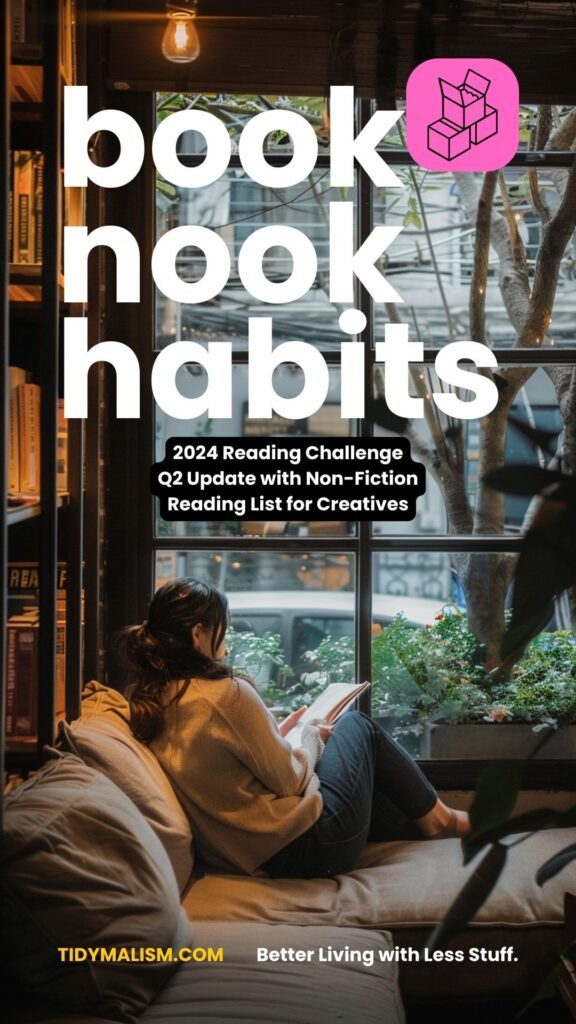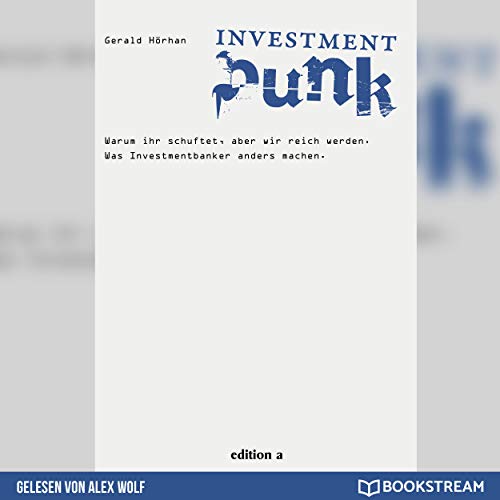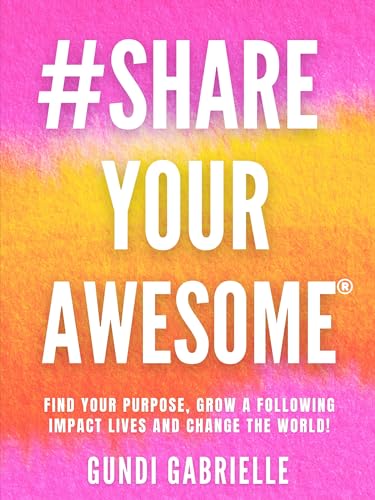Welcome back to my book nook! This is a continuation of the minimalist reading challenge I’ve been on since the start of the year. My goal has been to do less scrolling and more reading.
In the first quarter of this year I stayed on track, and I’m happy that I’ve continued to do so in Q2. Reading every day now has definitely become a habit at this point, and it’s one I look forward to.
By the end of Q1 I had read 15 books in total, so this quarter’s list picks up where I left off and thus starts with #16. My grand total so far is 26, right on target.
Check out the entire three-month reading list from Q1, which goes more in-depth into my reasons for wanting to do this challenge and why I’ve been doing a lot of reading on a Kindle.
This quarter’s list is 100% non-fiction, with a strong focus on solopreneurship and digital creativity.
Q2 Reading List
16. Niche Navigator: How To Find A Profitable Niche In 1 Hour by Miles Beckler
I discovered Miles on X and YouTube a while back and kicked off this quarter’s minimalist reading challenge with “Niche Navigator.” I’m glad I did.
It’s a concise, action-oriented guide for digital entrepreneurs and freelancers looking to quickly identify profitable niches in the online marketplace.
Beckler distills years of digital marketing expertise into a straightforward process that promises to uncover viable business niches in just an hour. He emphasises the importance of passion aligned with market demand, guiding you through analysing competition, customer pain points, and potential profitability.
Beckler offers tools and techniques for rapid market research, including keyword analysis and social media engagement metrics.
I liked his approach because it’s designed to minimise risk and investment by validating niche potential before diving into full-scale business development.

17. Sales Funnel Sabotage by Miles Beckler
I liked the last book so much I picked up “Sales Funnel Sabotage” by the same author. In this one Beckler goes into the critical mistakes entrepreneurs and online marketers make that can cripple their sales funnels and impede business growth.
With an engaging and insightful approach, Beckler identifies common pitfalls in sales funnel design, from convoluted customer journeys to neglecting key components like value ladders and lead magnets. I got some helpful pointers for improving my own newsletter funnel and landing pages.
The book gives you some practical solutions and optimisations that can dramatically increase conversion rates and customer retention. Beckler emphasises data-driven decisions which I appreciated, as well as customer psychology, and continuous testing to build efficient and effective sales funnels.
If you’re looking to refine your online marketing strategy as a small biz owner or solopreneur, or just level up your digital presence, I can recommend checking this book out.
18. Investment Punk by Gerald B. Hörhan
Gerald Hörhan’s German-language “Investment Punk” challenges conventional wisdom about wealth, investing, and personal finance with a super provocative and contrarian approach.
If you live in the DACH region, you’ve probably heard of this guy or seen him in your feeds at some point. He’s an Austrian investment banker known for blunt commentary, who tends to argue against taking the traditional path of saving through bank accounts, life insurance, and pension funds, which he views as outdated and ineffective.
Hörhan advocates for a more aggressive investment strategy that includes leveraging debt for property investment, entrepreneurship, and the intelligent use of technology to manage finances and create new income streams.
I loved this book and the author’s unapologetic, direct style. It was an on-point critique of the societal norms around money and education, as well as being a motivator to break free from these constraints and achieve financial independence. If you read German, definitely check it out.
19. Manage Your Day-to-Day: Build Your Routine, Find Your Focus, and Sharpen Your Creative Mind by 99U
99U was Adobe’s resource and event series to help creatives and “Manage Your Day-to-Day” is a collection of insights and practical advice from leading creative minds aimed at helping individuals conquer the challenges of the modern work environment.
That was a mouthful, but this was a straightforward and helpful read. The book focuses on building a sustainable daily routine that promotes efficient work habits and a sharp, creative mind. It stresses the importance of segmenting your day into dedicated times for focus, collaboration, and rest to avoid burnout.
I liked the mix of essays and interviews from thought leaders and creatives who share their strategies for managing time, prioritising tasks, and tips for harnessing technology without becoming its slave.
Key themes included the need to make deliberate choices about when and how to tackle creative work, the role of mindfulness for mental clarity, and the critical impact of structured downtime.
20. How to Develop Your Personal Mission Statement by Stephen R. Covey
One of the best-selling business books of all time is 7 Habits of Highly Effective People, and “How to Develop Your Personal Mission Statement“ is one of those habits.
Since I’ve been working on building out my main business, a consultancy for localisation and content services, refining my own mission statement has been top of mind.
Covey’s focused guide is designed to help individuals articulate their own core values and long-term goals. This book is structured around the idea that a good personal mission statement helps you navigate professional landscapes while serving as a fundamental tool for personal fulfillment and decision-making.
Covey walks you through identifying your most deeply held beliefs, and translating these into a concise and powerful mission statement. The exercises included are introspective and designed to provoke deep thinking about one’s purpose and the impact one wants to make in the world. I found them very helpful.
21. Maximize Your Potential by 99U
Since #19 on this list had resonated with me, I downloaded another 99U book for my minimalist reading challenge when it showed up in my Kindle feed.
“Maximize Your Potential” explores the ways professionals can unlock their full potential by leveraging their existing skills, expanding their network, and adopting an attitude of continuous improvement.
This was another collection of essays from various experts who encourage readers to push beyond their current limits, explore new opportunities for growth, and cultivate creativity and innovation in their careers.
Each chapter provides insights on how to handle common professional setbacks, strategies for effective collaboration, and tips for fostering an environment that promotes risk-taking and learning from failure.
One of things they really hammered home for me is that ten years from now, we’re all likely going to be doing some new type of work that we can’t yet imagine. This means that if we don’t take intelligent risks today, we’ll be missing out on new opportunities. That in turn is the definition of a lucky person: someone who latches on to chances that crop up.
I like that proactive mindset, and it reminded me of an article I wrote about how happiness is an everyday choice we can either make or not make.
22. Social Media Marketing 2024 by Jeff Blade
I’m not going to sugarcoat it: I didn’t like this book and I’m glad I didn’t pay anything for it (it was part of my Kindle Unlimited subscription).
I was hoping for some hot new tips for the latest algorithm changes across social networks when I picked this up.
Instead, this volume contained AI-generated regurgitations with nonsensical sentences like “Comparatively speaking, social media marketing is an essential component of digital marketing as opposed to social media marketing.” 🤦🏻♀️
This “book” fell short in delivering actionable insights or current strategies, and was marked by outdated examples and a lack of depth in addressing the latest changes. I don’t believe it was written by a human being and can’t recommend it.
23. Neat: 10 Easy Steps to Change Your Life by Heather E. Carson
“Neat” goes for a straightforward, practical approach to decluttering and organising one’s personal and professional spaces to achieve a more focused and stress-free life. The author combines personal anecdotes with actionable advice.
Each chapter focuses on a specific area, from decluttering your home office to streamlining your digital presence, so you get some clear, manageable steps to create order and efficiency. Along the way, Carson emphasises the psychological and emotional benefits of minimalism, advocating that a neat environment leads to clearer thinking and improved productivity.
I found her solutions a bit simplistic and repetitive in some sections. However, for those new to the concepts of minimalism and personal organisation, this book offers a gentle introduction to making a few impactful changes for a more organised home.

24. #ShareYourAwesome by Gundi Gabrielle
I read a bunch of books last quarter from this author, and was still on the fence as to whether her often very helpful tips can outshine a thoroughly – for me – annoying writing style.
The awkwardly titled “#ShareYourAwesome” aims to inspire readers to leverage social media and content creation to build a personal brand and connect with a broader audience. That sounded good to me. Unfortunately though, the book is significantly undermined by so many grammatical and punctuation errors that I was completely distracted from its message.
While intended to be an enthusiastic guide to expressing one’s unique self and talents online, the lack of editorial polish suggests a hasty publication process that just doesn’t live up to even basic self-publishing standards. The content, though potentially valuable, struggles to shine through the persistent issues with language and formatting. A shame.
For readers seeking guidance on personal branding, the core ideas about authenticity and engagement in “#ShareYourAwesome” might offer some insights, but the presentation may prove frustrating. This book could benefit greatly from a thorough edit to align its execution more closely with its aspirational message.
25. Key Person of Influence by Daniel Priestley
Daniel Priestley is a pretty big name on social media, and “Key Person of Influence” is his strategic guide to becoming a central figure in one’s industry through personal branding and influence. (By now you can tell that personal branding was a huge topic for me these past few months!)
Priestley outlines a five-step method designed to elevate professionals to a status where they are widely recognised, respected, and rewarded for their expertise.
He takes you through the five steps include perfecting your pitch, publishing your insights, productising your knowledge, raising your profile, and partnering with other influencers. The structure was concise and the information valuable.
Priestley emphasises the importance of clarity in communication, the power of authoritative content, and the value of scalable products that reflect one’s expertise. He also discusses strategies for increasing visibility both online and in traditional media, alongside the benefits of building and nurturing a network of valuable partnerships.
If you’re a consultant, solopreneur or freelancer, I think you’d like this book if you’ve been struggling with the whole personal branding spiel.
26. Creating an Income Stream Through Real Estate as a Small-Time Landlord by Louie Bacaj

I “met” Louie through an excellent community I joined a while back, Smallbets.com, went to one of his workshops there and liked both his vibe and the stuff he’s into.
“Creating an Income Stream Through Real Estate as a Small-Time Landlord” (only available on Gumroad) offers practical advice for beginners looking to generate passive income through property investment.
It’s mainly geared to US readers, but even though I’m in Europe, I found it fascinating to draw parallels and discover some weird differences between our homeownership systems.
Bacaj covers the fundamentals, from selecting the right properties and understanding local market dynamics to managing tenants and maintaining properties effectively. He underscores the importance of due diligence, budgeting for unexpected expenses, and building a reliable network of contractors and service providers.
Bacaj’s approach is straightforward and accessible, and I liked his down to earth, guy-next-door style of writing. He definitely makes the complexities of real estate investment manageable for total newcomers, so I can recommend this as a good resource for anyone in the US who’s interested in leveraging real estate to build a steady income stream.
The Minimalist Reading Challenge Continues…
I stuck with my reading habit after writing up this post. Check out the next list of great books I discovered in the following quarter. 🤓
How about you, have you read any of these? What topics have you been into lately? Do you tend to read hard copies, or have you also switched to a Kindle like me? Drop a comment below and share your thoughts!
















Leave a Reply